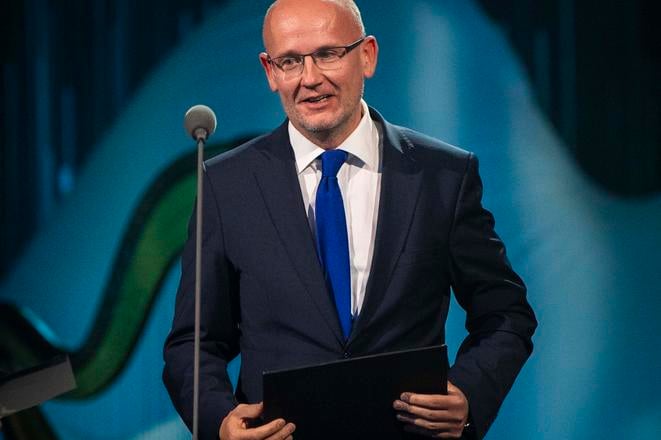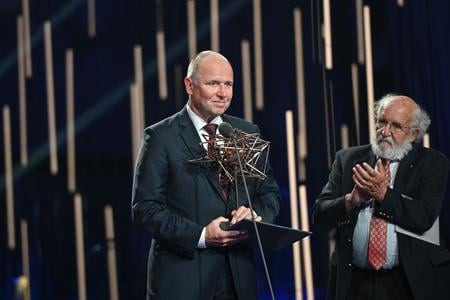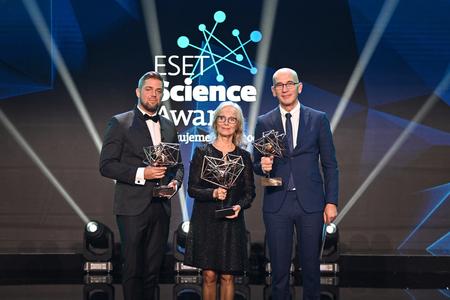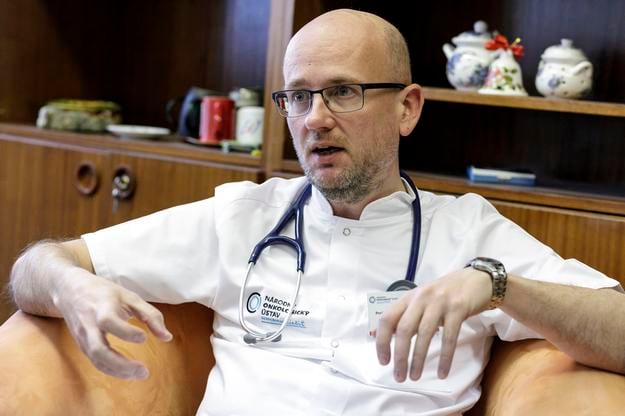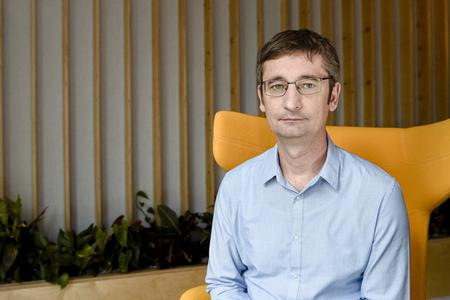MICHAL MEGO is the head of the 2nd Department of Oncology at the Faculty of Medicine of Comenius University and the National Cancer Institute in Bratislava.
He began studying medicine in 1995 and, prior to taking up his current post, worked abroad. He has used the knowledge he had gained working outside Slovakia at the Translational Research Unit.
The Slovak Spectator talked to him about what he learned abroad, the goal of the Unit, how patients are involved in oncology research, and teaching students. "The older I get, the more I feel the need to pass on what I have learnt, so that a generation will be formed that will be able to teach the generation that comes after them," he says.
You worked abroad for several years. What did you gain from the experience?
I had the opportunity to go to the Vienna School of Clinical Research, and later I worked in America. The former was a fantastic experience, experts from all over the world explained to us the basic methodology of clinical research, which was not taught much in Slovakia. Only in recent years have efforts been made to teach this to the PhD students at the faculty.
Why was it not taught?
It's hard to say. I think we lacked the expertise and the field was also gradually developed.
Where in the US did you work?
At the MD Anderson Cancer Center in Houston, Texas, the largest oncology hospital in the world. It has repeatedly been ranked no 1 in America. About 20,000 people work there, treating 70,000 patients daily.
How did you get the work there?
I received a scholarship from the Union for International Cancer Control. The scholarship is given to five people from all over the world every year.
What did you do at the centre?
We focused on circulating tumour cells responsible for the formation of metastases. We discovered a new subtype that was interesting because of its resistance to chemotherapy and radiotherapy. Later we found out that patients with the cells had a much worse prognosis than those whose tumours did not release the cells into their blood, even with similar diagnosis and histology.
To stay up to date with what scientists in Slovakia or Slovak scientists around the world are doing, subscribe to the Slovak Science newsletter, which will be sent to readers free of charge four times a year.
When you returned to Slovakia you established the Translational Research Unit. What is its goal?
It is a lab that aims to connect basic research with clinical practice. This means that an interesting result in the lab moves into clinical trials as soon as possible and vice versa. When we have a problem in practice - which is very often - the problem can sometimes be modelled in the lab, either in mice or cell lines. So we try to dissect the problem and then use the solution in practice.
What exactly does as soon as possible mean in this context?
That depends. There have been cases when it has been two and a half to 3 years between the discovery of the Achilles heel of a particular tumour and researching treatment, which is extremely fast. Then there are cases that have taken decades. It's also in part down to luck, about connecting people who do research. Many factors are involved.
What are you currently researching at the Unit?
Two main areas. Firstly, circulating tumour cells. Secondly – and this is perhaps an even more developed area - the research of testicular tumours, mainly their resistance. That is, what mechanism stops some tumours responding to chemotherapy, and research of new drugs that could overcome that resistance.
Is there a reason you focus on this type of tumour in particular?
It's a historical thing. Slovakia has a relatively long tradition in this area, started by Professor Dalibor Ondruš, who is still working, and my predecessor, Associate Professor Jozef Mardiak. We are sort of the next generation. The tumour is interesting in that it is rare, but it is the most common tumour in young men between the ages of 20 and 40. It is also interesting in that about 95 percent of patients are cured, but that means 5 percent are not. Since these are young people, it is all the more motivating to look for a cure. We also think that what we learn from one type of tumour can be applied to the study of other types in future.
Even if the tumours are in completely different parts of the body?
In principle, yes. Some mechanisms may be common. It is not about directly transferring the results of a particular cure, but established methodologies, models for studying resistance problems. I think these can be applied elsewhere.
You often involve your patients in your research. How important is it that they are part of it?
It is extremely important that research does not end at lab level. This means that if something looks promising in the lab, there is a chance it can also be tested in patients. Worldwide - this does not apply only to our research - about 10 percent of things that work in the lab are confirmed clinically. That is why it may seem that every now and then news about a breakthrough appears, but then if you read more closely you realise it was an experiment on mice or cell lines. That is why it is important not to stay just in the lab, but to get it to clinical practice.
So these patients receive experimental treatment?
There is standard treatment, which is what is recommended by experts or what is in textbooks, but at a certain point, when the standard treatment is not working, experimental treatment tested in clinical trials comes into consideration. The choice is either this or do nothing. Of course, in order to receive such treatment, a clinical study must be approved by the State Institute for Drug Control, all legal requirements must be met and, of course, it must be voluntary on the part of the patient.
In developed countries and the places I have worked, the emphasis is on the patient having access to experimental treatment. For example, in Houston, there are 1,100 clinical trials actively open as compared to 20 in Slovakia. In the case of the former, maybe 50-60 percent of patients are treated as part of a clinical study at some point. Our institute tends to accredit itself to be part of the best oncology institutes in the world. One of the conditions is that at least 5 percent of patients must be treated in clinical studies. This is one of the signs of the quality of a workplace.
Do people often volunteer?
If we have exhausted all the standard treatment options and there is nothing else, no hope of treating the disease, versus trying an experimental drug that has promising results, then the decision is very easy for the patient. If I were in that situation, the decision would be relatively easy.
Do they take the view that if it doesn't help them, something could come of it that would help others?
There is that altruism, yes. Clinical trials are primarily aimed at helping a patient. The rest is a side effect for society. Experience shows that a patient who is treated in a clinical study is better off in the long term than one who is treated only with standard treatment. It is something extra. This means that after using all standard treatment, they have a chance of being given something that has never been given here before.
We also have studies that, globally, did not go well, but there were patients who benefited from them. In other words, a study was designed so that 10 out of 20 patients would benefit, but only two eventually did. So the development of the drug was stopped, but those two lived on for five more years. Otherwise, the disease would have won out in a few months. From experience of normal clinical practice, I can say that there is a benefit for patients.
What do people usually ask when they receive such an offer?
Most patients ask, "Doctor, what do you think? Should I go for it or not?" The patient is always a layperson. If they agree, they are given forms on informed consent, which sometimes run to 15 pages due to various legal regulations, to ensure everything is in order. A patient's decision is largely conditioned on their relationship with their doctor, in other words the doctor's opinion, and then by the stage of the disease. As I mentioned, the scales are largely in favour of a clinical study and, conversely, if it were a study that would be for the sake of the science behind it only, or something similar, it should not have even passed an ethics committee. Something unethical should never reach a patient.
You won the public prize at the ESET Science Awards – basically, the people chose you. This comes at a time when experts and scientific consensus itself today faces a huge amount of questioning from parts of the public, and yet you say that most patients ask for your opinion.
It is always about the trust between a patient and a doctor. My opinion is that a patient who does not trust me will not come to me. People who question medicine usually do not even go to doctors, or they come when everything alternative, conspiratorial, etc. has failed and they realise they have nothing else left. It is very difficult for them to admit that they were wrong. Some of these people who eventually come will run away again as soon as the standard "bad medicine" starts working.
As for trust among the general public, I'd say, and perhaps this does not apply solely to Slovakia, there is a crisis of authority. I do not want to get into politics or strikes (the recent threat of strikes by Slovak doctors - Ed. note). I don't want to comment on whether the strikes are right or not, the problem is that we have had 3 or 4 strikes already and the communication from politicians was more akin to calling striking doctors names, that they are people who only care about money and the like. I understand why they did it. Then the Covid-19 pandemic came and politicians were surprised that doctors do not have authority when it comes to the public and related measures. Well, these things are interconnected. Certain rules should be respected.
In addition to research, you also work with students, future oncologists. Are you battling brain drain?
There is a primary outflow of students who immediately go abroad once they have graduated. And that is a tragedy. But we still have a relatively large number who are interested, which makes me very happy. Not only they are interested in oncology, but also in science within oncology. We have a huge investment debt in healthcare. Our institute is, I must say, in very good shape, but ordinary hospitals… their visual impression is terrible - you cannot expect that this is supposed to motivate young doctors - not to mention various systemic problems.
If we want to improve the state of science, medicine and everything, we need to invest in education. I do not think that the solution is to spend a lot of money for scientists to return from abroad. Of course, we need to support them too, but we need to invest in education in primary school, in quality teachers. A huge investment debt is being created at the moment and society will suffer for it.
But it is still important for students to have the same kind of opportunities you did, and bring knowledge back to Slovakia.
Definitely. I try to motivate my young colleagues, we arrange internships abroad for them. Many have already returned. It is extremely important that they have contact with the outside world. The playing field is not Bratislava, not Slovakia, but at least Europe at the moment. The older I get, the more I feel the need to pass on what I have learnt, so that a generation will be formed that will be able to teach the generation that comes after them. If our generation does not pass knowledge on, the next one will have a hard time acquiring it on their own.
This article is supported by the ESET Foundation, whose annual ESET Science Award recognises exceptional scientists.


